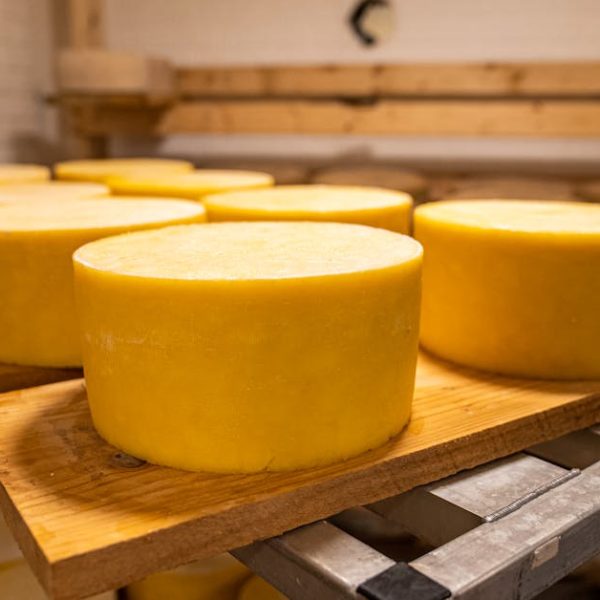Human beings have been using cheese for its flavor, versatility, and long shelf life for millennia. The beauty of cheese lies in its diversity – a multitude of textures, flavors, colors, and shapes. Given this variety, it’s no surprise that not all types of cheese react the same way to the freezing process. This fact becomes particularly important when we want to extend the shelf life of our favorite dairy product. So, what kind of cheese can you freeze? Let’s delve into the refrigerator’s frosty depths to discover the answers.
Understanding Freezing Cheese
Freezing cheese might seem counterintuitive, especially since cheese is essentially a living product with active bacteria and mold. So, how does freezing interact with these living organisms?
The science behind freezing cheese involves the formation of ice crystals in its water content. These crystals puncture and break down the cheese’s structure. As a result, only cheese types with specific characteristics – primarily cheeses with high moisture content and low mold content – can survive freezing while retaining their quality. High-moisture cheeses tend to fare well due to their capacity to hold more water, better accommodating ice crystal formation. Similarly, low-mold cheeses produce less ammonia, resulting in reduced bitterness post-thawing.
Pro Tip: Keep the temperature consistently below 0°C and use proper wrapping methods to avoid entry of external air, which can cause freezer burn. Freezer-safe bags or wrap makes your cheese stay fresh and soft.
The Best Cheeses To Freeze: Hard Cheeses
Hard cheeses such as Cheddar, Swiss, Gouda, and Monterey Jack are prime candidates for freezer storage due to their low water content and high fat content. These properties help the cheese recover post thawing, maintaining their original texture and flavor profiles.
Here’s a quick look at how these cheeses react to freezing:
| Cheese | Texture after Freezing | Flavor after Freezing |
|---|---|---|
| Cheddar | May become crumbly | No significant flavor change |
| Swiss | Retains texture well | No significant flavor change |
| Gouda | Texture might change slightly | Flavor remains rich |
| Monterey Jack | May become slightly crumbly | No significant flavor change |
When freezing hard cheeses, always pre-cut them into small pieces or grate them. This way, you’ll avoid thawing and refreezing multiple times, which can lead to texture and flavor loss. Remember to wrap cheese tightly with freezer paper or put in a BPA-free ziplock bag for the best results.
Freezing Semi-Hard and Blue Cheeses
The freezing process also extends well to a variety of semi-hard cheeses like Colby, and blue cheeses such as Gorgonzola and Roquefort. These cheeses share a higher moisture content but with unique mold cultures, making them suitable freezer-friendly varieties.
While freezing, make sure to:
- Pre-cut the cheese into smaller servings
- Wrap each piece tightly
- Store in a freezer-safe bag
However, bear in mind that the distinctive flavor of blue cheeses may be slightly muted after freezing. For true blue cheese enthusiasts, this could be a crucial counterpoint. On the other hand, semi-hard cheese like Colby, retains its mild and creamy taste really well even after being frozen and thawed.
Cheese Blocks vs. Shredded Cheese: Which to Freeze?
You may wonder if it’s better to freeze cheese in block form or shredded. Both methods have their own set of pros and cons.
Freezing cheese blocks is simple and straightforward. It is best for cheeses you want to keep for extended periods because solid blocks restrict airflow and prevent drying out or developing freezer burn. On the downside, you have to thaw the whole block even if you only need a little cheese.
Shredded cheese, on the other hand, frees you from the necessity to thaw for small amounts. You can grab exactly what you need and return the rest to the freezer. However, shredded cheese can clump after freezing, making it a bit tricky to separate individual pieces.
Here are some tips when freezing both:
✔️ Cheese Blocks
1. Cut the block into smaller portions
2. Wrap each portion in freezer paper or cling wrap
3. Place in a zip-lock bag, remove as much air as possible
✔️ Shredded Cheese
1. Spread shreds on a baking tray and freeze for an hour before packing
2. Place in a zip-lock bag, remove as much air as possible
3. Make sure to squeeze out pockets of air between the shreds to prevent clumping
Thawing and Using Your Frozen Cheese
Thawing your frozen cheese correctly is crucial to retaining its texture and flavor. The key strategy is to avoid a rapid change in temperature. Hence, the best practice is to shift your cheese from the freezer to the refrigerator, allowing it to defrost slowly over 24 hours.
Thawed cheeses can sometimes be crumbly and less appetizing in their raw form. But don’t worry! They are still perfect for melting into a variety of dishes. Grated Cheddar or Monterey Jack works great in casseroles, pizza, soups, and sauces, while Swiss cheese can be added to quiches and frittatas.
The Cheese You Should Never Freeze
Cheese is robust, but not every type stands up well to freezing. Soft, high-moisture, and mold-ripened cheeses like Brie, Camembert, and mozzarella do not freeze well.
These cheeses, when frozen and then thawed, can become grainy and crumbly, with a noticeable degradation in both texture and taste. The quick freezing process disrupts their delicate structure, leading to an undesirable outcome.
Here are a few cheeses not to freeze:
- Brie and Camembert: Their creamy texture turns watery and lumpy after freezing
- Mozzarella: Fresh mozzarella can lose its iconic soft, milky texture
- Ricotta, cottage, and cream cheese: They become grainy as the water separates from the cheese curds
Freezing cheese can be an effective way to extend its shelf life and reduce food waste. Still, it’s essential to remember that while many cheeses handle freezing admirably, not all do. By knowing which kinds freeze well and which don’t, you can ensure no surprise disappointments when it’s time to cook your favorite cheesy dishes.
Key Takeaway:
- Freezing cheese involves the formation of ice crystals that can alter the structure and flavor of the cheese. Cheeses with high moisture content and low mold content generally freeze well.
- Hard cheeses such as Cheddar, Swiss, Gouda, and Monterey Jack are great candidates for freezing due to their low water content and high fat content.
- Semi-hard cheeses like Colby and certain Blue cheeses such as Gorgonzola and Roquefort can also be frozen, although blue cheeses may experience a slight muting of flavor.
- Both cheese blocks and shredded cheese can be frozen with notable pros and cons. Cheese blocks keep longer but require full thawing for use, while shredded cheese allows for partial usage but may clump together.
- Soft, high-moisture, and mold-ripened cheeses like Brie, Camembert, and mozzarella are not suitable for freezing as they can become grainy and crumbly, with noticeable degradation in texture and taste.
Remember, freezing cheese is an effective way to extend shelf life and reduce food waste. With the right knowledge, you can enjoy your favorite cheeses for longer without compromising too much on their original quality.
FAQs
Q: How long can I keep cheese stored in the freezer?
A: Generally, harder cheeses can last 6 to 8 months in the freezer if stored correctly. Remember, frequent thawing and refreezing can negatively affect the cheese’s texture and flavor.
Q: Can I freeze cream cheese?
A: Technically, you can freeze cream cheese but it’s not necessarily recommended. The texture can become grainy and it’s less spreadable once thawed. However, it’s still okay to use in cooking or baking.
Q: Should I freeze cheese in its original packaging?
A: While cheese can be frozen in its original packaging, it’s better to wrap it tightly in freezer paper, cling wrap, or a BPA-free ziplock bag. This helps to prevent freezer burn and keeps the cheese fresher for longer.
Q: Does freezing cheese change its nutritional content?
A: Freezing cheese does not significantly change its nutritional content. The major changes that occur during freezing are related to texture and flavor.
Q: Can I freeze cheese with a hint of mold?
A: It’s not recommended. Mold can continue to grow even in freezing temperatures, changing the cheese’s flavor over time. If you see mold on hard or semi-hard cheese, cut off at least 1 inch around and below the mold spot before you consider freezing.
Feel free to share this article and explore more posts on our website about food preservation and cooking tips. Your kitchen adventure just got a lot cheesier and exciting with these practical insights!





